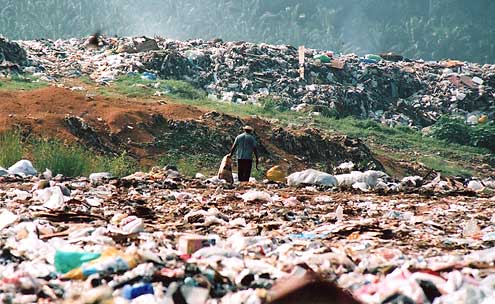









 |

 |
 |
PCB Symposium 2002 in Japan |
|
 |
 |
| Activities
of 2002-2003 |
 |
|
|
We, the Japan Offspring Fund (JOF) still continue
our efforts to eliminate PCBs. (The PCB project 2003 is conducted
using a special grant from the Japan Fund for the Global Environment
of the Japan Environment Corporation.)
Participation in POPs Conference
POPs is a general term meaning persistent organic pollutants,
and PCBs are POPs. As the movement to eliminate POPs developed,
governmental negotiations started at UNEP (United Nations
Environment Programme) and in May 2001, the Stockholm Convention
on POPs was adopted.
In order to discuss further the specific details of this convention,
and to call for more countries to ratify it, the 6th Intergovernmental
Conference was held in Geneva in June 2002. JOF participated
in this conference.
Since officials from international organizations that are
in charge of POPs, and government officials and NGOs from
around the world attended this conference, it was an ideal
forum for exchanging information and presenting our activities.
When we gave out our STOP PCB posters, many people showed
interest. The 200 posters we brought with us ran out within
30minutes. Also, we had discussions with NGOs that are members
of the "International POPs Elimination Network," which is
composed of NGOs from around the world, and we promised each
other to continue working toward the elimination of POPs.
Research on waste dumping sites in Malaysia
We visited Malaysia in October 2002 and collected soil
samples from four final waste dumping sites. In Malaysia,
open burning is basically prohibited; however, though it
was not clear whether intentional or spontaneous, we witnessed
smoke and fire at dumping sites. Also, there were people
collecting whatever they could find of value in the dumping
sites and there were even cattle roaming over the site.
These people and cattle are clearly at risk of contamination
from chemicals dumped at dumping sites.
We analyzed the soil samples and found dioxin and PCB contamination.
We then presented the results at an international symposium
in Malaysia in February 2003.


International symposium and a workshop
In February 2003, a symposium (February 24) and a workshop
(February 25) were held. The results of research on waste
dumping sites, the effects of POPs on wild animals living
far from human activities, and the current situation of PCB
problems in Malaysia and Taiwan were reported. In the workshop,
the actions that NGOs can undertake for the elimination of
PCBs were discussed. Contents of the symposium and workshop
are available on the JOF home page (after March, 2003.)
http://tabemono.info/english/index.html
STOP PCB Pollution Symposium in Malaysia
February 24, 2003 Sunway Hotel (Penang)
< lecturers>
Dr. Mafumi Watanabe (Center for Marine Environmental Studies,
Ehime University, Japan)
Ms. Jackie Hildering(Stubbs Island Charters Ltd., Canada)
Dr. Kate Hughes (Toxics Network, Australia)
Ms. Hwang Shu-te (Homemakers' Union and Foundation, Taiwan)
Ms. Hatijah Hashim (Consumers' Association of Penang (CAP),
Malaysia)
STOP PCB Pollution Workshop
February 25, 2003 Sunway Hotel (Penang)
NGOs from 10 countries (Malaysia, Japan, Taiwan, Hong Kong,
Korea, the Philippines, Indonesia, China, Canada, and Australia)
exchanged information and discussed their further activities.
|
|
|
